|
Vol. 13 Issue 3 July - September / 2015
Published on website | Date : 2016-04-10 12:04:10
CARDIAC ELECTROPHYSIOLOGICAL EVALUATION IN STROKE PATIENTS WITHOUT CARDIAC ABNORMALITIESZeena A. Hussein, Abbas F. Al-HashimiAbstractBackground:Physicians have known for centuries that primary cardiac disorders can lead to stroke, but the realization that strokes may result in the cardiac abnormalities is much more recent. Cardiac disturbances are common following stroke such as cardiac arrhythmias or repolarization abnormalities. To provide optimal care, it is essential to distinguish whether cardiac abnormalities are caused by acute stroke or unrelated to it.
Objectives:To evaluate the cardiac electrophysiological changes in patients with stroke and study the correlation of stroke type, electrocardiographic and echocardiographic findings with the holter findings. Methods: A case control study was conducted on 52 persons of either sex; involving 32 patients suffering from stroke for the first time without underlying cardiac disease, and 20 healthy persons. Electrocardiographic examination to record cardiac electrical changes, holter record for one hour to detect changes in heart rate variability parameters and echocardiogram to asses heart function have been done for each patient and subject control. Results:No significant difference was found between patient and control groups regarding sex and age, but there was a significant difference between the two groups regarding the SDNN, SDANN, rMSSD parameters, QT dispersion, ST segment shape and T wave shape. Conclusion:The Electrocardiographic changes can occur in stroke patients without cardiac problems. The non-invasive parameters (heart rate variability, QT dispersion) are useful tests in patient with stroke to assess cardiac abnormalities. Key words: Electrocardiographic changes, stroke, cardiac problem. Full-text |
Some tools below are only available to our subscribers or users with an online account |
 |
Please wait until the current process completes ... |




